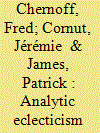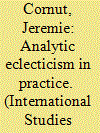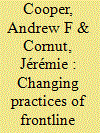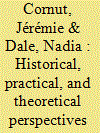|
|
|
Sort Order |
|
|
|
Items / Page
|
|
|
|
|
|
|
| Srl | Item |
| 1 |
ID:
175154


|
|
|
|
|
| Summary/Abstract |
Some scholars in International Relations and comparative politics continue to debate how to obtain the strongest explanatory theory whereas others hold that each approach should be treated as its own area of research. Both of these groups tend to agree that factors from across paradigms cannot be coherently combined with each other. On the contrary, Sil and Katzenstein have argued for analytic eclecticism in scholarship, which would not treat research traditions or paradigms as strict limitations on theory construction. Inspired by pragmatism, they have made a compelling case that considerations of usefulness and knowledge cumulation are more important than paradigmatic fidelity. This forum examines analytic eclecticism from the points of view of neo-empiricism, feminism, and interpretive constructivism, followed by a reply by Sil. A decade has passed since the publication of Sil and Katzenstein’s Beyond Paradigms, so it seems appropriate to reflect upon the strengths and weaknesses of analytic eclecticism.
|
|
|
|
|
|
|
|
|
|
|
|
|
|
|
|
| 2 |
ID:
137606


|
|
|
|
|
| Summary/Abstract |
The relation of different theoretical approaches to one another is a disquieting question in International Relations (IR). Building on recent scholarship addressing the logic of questions and the analytical tools the scholarship provides for investigating the contributions of different explanations this piece argues that any and all explanations are an answer to a contrastive why-question. First, the article presents the objections to eclecticism. It then reviews the application of the logic of questions to IR and develops a “contrast theory” clarifying this logic: Seeking an explanation means delimiting a contrast space within a specific interrogatory context. The article lastly shows how these concepts help in thinking about post-foundational science of IR, that is, a science with no universal epistemological foundation to knowledge. I argue that the pragmatic, problem-driven and complexity-sensitive research agendas are a stronger foundation than currently predominant conceptualizations. An example, drawn from Iran's attempts to acquire nuclear weapons, helps illustrate the value-added by a logic of questions approach
|
|
|
|
|
|
|
|
|
|
|
|
|
|
|
|
| 3 |
ID:
164980


|
|
|
|
|
| Summary/Abstract |
This article develops the concept of ‘frontline diplomacy’ – what practitioners referring to work in embassies, consulates, and permanent representation as ‘the field’ –, defined here as all diplomats’ activities taking place away from headquarters. IR scholarship tends to focus on Ministries of Foreign Affairs located in capitals. On the contrary, building on the practice turn in IR, we first show that international politics emerge from frontline practices. Adding to criticism against the practice turn, we then explain that it has missed important transformations occurring in frontline diplomacy because it tends to privilege stability over change. We finally discuss two innovations in frontline practices: the action of Sherpas in G20 summits following the 2008 crisis and the use of Twitter by US Ambassador to Russia Michael McFaul (2012–14). For each we answer three questions: How do these activities transform traditional modes of operation? How are non-state actors involved in them? What do they tell about transformation of global politics? Because diplomatic practices at the frontlines epitomise international politics, these new directions for inquiry contribute substantively to IR scholarship. At the theoretical level, they enrich the continuing encounter between IR and diplomatic studies through practice theory and help to understand change in practice.
|
|
|
|
|
|
|
|
|
|
|
|
|
|
|
|
| 4 |
ID:
170933


|
|
|
|
|
| Summary/Abstract |
This article analyses changes in diplomatic practices brought by twenty-first century communications technologies. There exists a close relationship between communications technologies and diplomatic practices. Since the invention of the telegraph at the end of the nineteenth century, diplomacy has been conducted at a progressively faster pace. The most recent technological developments associated with Internet have increased the speed and reach of communications, with consequences in international politics that International Relations scholars have yet to understand. Building on existing scholarship in diplomatic studies, the analysis adopts a historical perspective on the use of technology in diplomacy, examines the impact of digitalisation on diplomatic practices, and suggests new research questions that scholars need to answer. All this shows that International Relations scholars would be well-served by looking at the transformative impact of new communications technologies.
|
|
|
|
|
|
|
|
|
|
|
|
|
|
|
|
| 5 |
ID:
141726


|
|
|
|
|
| Summary/Abstract |
This article shows that the simultaneous management of three different social roles – knowledge producer, representative of a government, and bureaucrat – defines the everyday work and practice of contemporary diplomats posted at embassies. This argument rests on an analysis of information gathering in Western embassies before, during and after the eighteen days of the revolt that ousted Egyptian President Hosni Mubarak in 2011. I first identify various practices influencing diplomatic knowledge and prompting the production of particular interpretations of the revolt in Egypt. I then analyze how actors manage multiple positions and dispositions within overlapping social fields. This point illustrates what practice theorists mean when they assert that agents are always speaking from a position. Overall, the article unravels what being a diplomat posted abroad actually consists of in practice, complementing existing studies on the diplomatic mode of knowledge production. I provide insights on the interactions between diplomats and non-state actors and show that diplomats’ social skills and analytic competence constantly require and support each other.
|
|
|
|
|
|
|
|
|
|
|
|
|
|
|
|
|
|
|
|
|